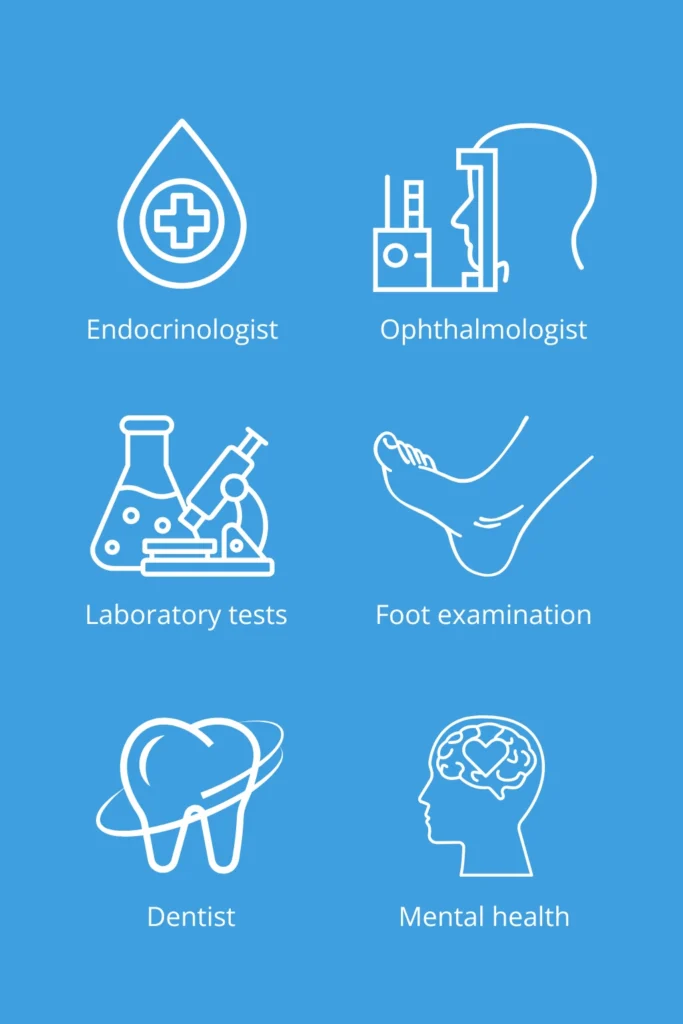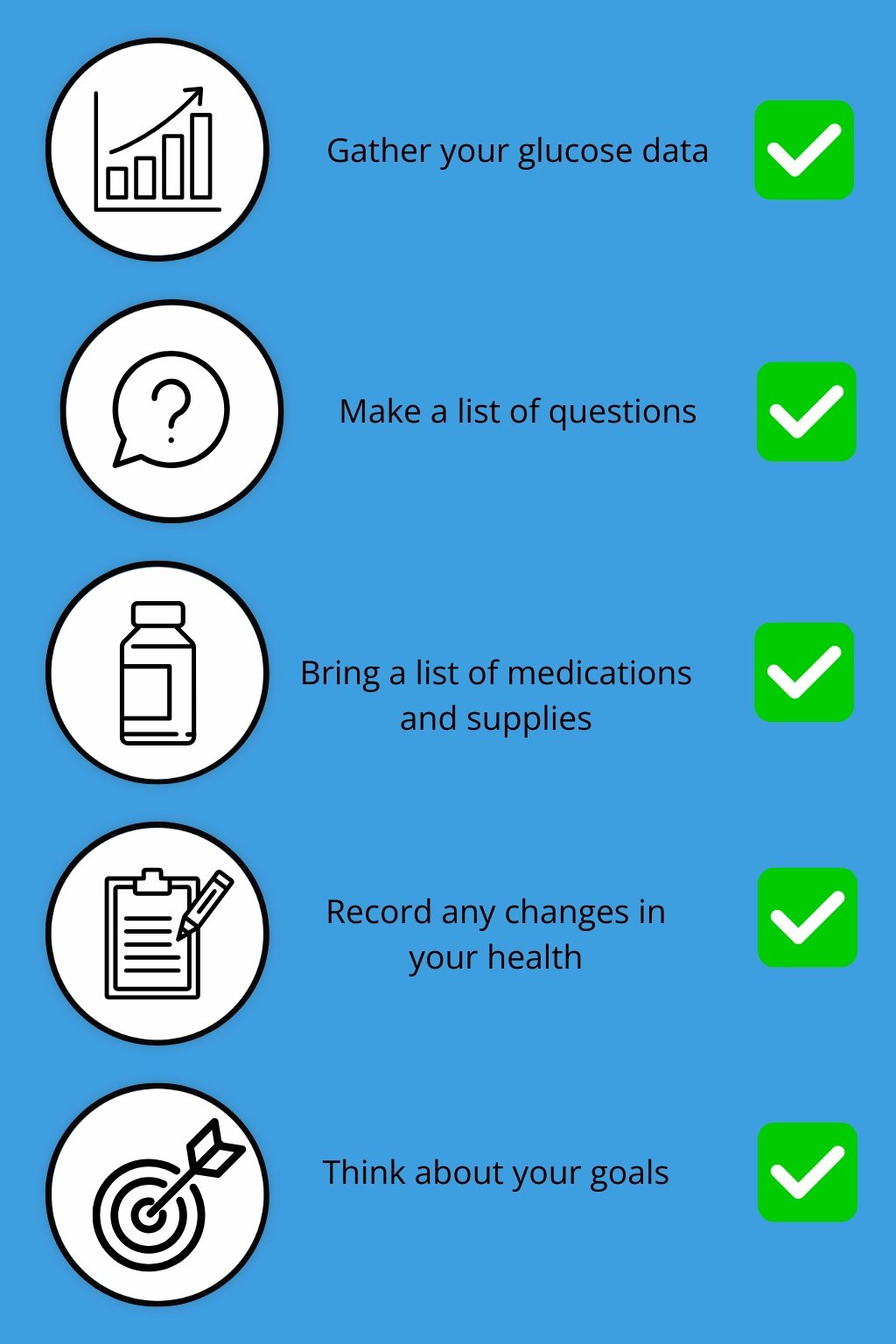Ongoing Care
By keeping up with your routine appointments and screenings, you give yourself the best chance to prevent complications and live well with diabetes.
This content is not medical advice. Always consult your endocrinologist, doctor or diabetes care team before making any changes to your diabetes treatment or daily management.
Regular check-ups for lasting health
Your meals combine three main macronutrients: carbohydrates, protein, and fats plus hydration from water and water rich foods. Carbs drive blood sugar changes, protein and fats help smooth those effects and good hydration supports insulin action and digestion. Learning what each does and how to pair them makes blood sugar more predictable and helps prevent big swings.
Types of Check-Ups and Screenings
Endocrinologist – The primary doctor for managing type 1 diabetes. Appointments are usually scheduled every 3 months. These visits include checking HbA1c, reviewing blood glucose logs, and discussing treatment, nutrition, physical activity, and any issues with technology (pump, CGM). If needed, the doctor will make adjustments to ensure the therapy fits your lifestyle as best as possible.
Ophthalmologist – An annual eye exam is essential for the early detection of diabetic retinopathy, glaucoma, and cataracts. Many eye changes cause no symptoms in the early stages, and timely treatment can prevent vision loss.
Laboratory Tests – Recommended at least once a year, and often more frequently. These include tests for kidney function (creatinine, microalbuminuria), lipid levels (cholesterol, triglycerides), HbA1c, as well as checks for vitamin D and thyroid hormones (TSH), which can affect glucose control.
Foot Examination – Assesses circulation and nerve sensitivity. The goal is to prevent neuropathy, wounds, and infections that may heal more slowly in people with diabetes. Your doctor or nurse can also provide advice on proper foot care at home.
Dentist – Diabetes increases the risk of gum disease and oral infections, which can make blood sugar control more difficult. Regular dental visits (at least once a year) and good oral hygiene are an important part of overall health care.
Mental Health – Living with a chronic condition can cause stress, anxiety, or feelings of burnout. Talking to a psychologist, joining a support group, or using counseling services can help you stay emotionally stable and motivated in your daily diabetes management.

Additional Recommendations
Blood Pressure Check – Have your blood pressure measured at every doctor’s visit. High blood pressure can speed up complications affecting the kidneys, heart, and eyes, so early detection is key.
Vaccinations – Keep your vaccinations up to date. An annual flu shot and, when recommended, pneumococcal vaccination can help reduce the risk of severe infections, which people with diabetes are more prone to.

How to Prepare for a Check-Up?
Good preparation for your appointment not only saves time but also helps your doctor make better decisions about your treatment. Here are a few steps to make the process easier:
Gather your glucose data – Export data from your CGM or note down averages and extreme values from your meter. Include notes about hypoglycemia, high readings, and the situations that triggered them (e.g., meals, exercise, stress).
Make a list of questions – Before your visit, write down any concerns you have: about treatment, insulin pumps, sensors, nutrition, symptoms, or new therapies. This ensures you won’t forget to address important topics during your appointment.
Bring a list of medications and supplies – Include insulin types, doses, any other medications, and expiration dates for supplies (test strips, sensors, infusion sets).
Record any changes in your health – Note new symptoms or changes in vision, body weight, energy levels, mood, sleep, or appetite. Even small details can help your doctor spot a potential issue.
Think about your goals – Define what you want to achieve by your next visit: more stable blood sugar, fewer hypoglycemia episodes, adjustments for physical activity, or changes in your diet plan.
Preparing ahead makes each check-up more efficient and increases the chances of getting clear, practical advice to help you manage your health more effectively.
Mental Health and Diabetes
Living with type 1 diabetes can be emotionally demanding. Diabetes-related stress, fear of hypoglycemia, and burnout are common and treatable. Ask your healthcare team to include a quick check-in about your mood during routine visits.
Seek extra support if you experience low mood, constant worry, changes in sleep or appetite, or avoidance of appointments lasting more than two weeks.
Helpful steps: talk to your doctor, request a referral to a psychologist familiar with diabetes, join a support group, involve your family, and use device settings (alerts, reports) to reduce daily burden. Your mental health is part of your diabetes care — seeking support is a sign of strength.
For more information about the emotional side of diagnosis, visit: Emotional Side of Diagnosis.

Join as a T1D Warrior

Our T1D Warriors are children, parents of children with diabetes, and individuals living with type 1 diabetes who share their personal experiences to inspire and support others. Every story, every blog post, and every piece of advice you find here comes from someone who has truly lived it — with honesty, courage and a whole lot of heart. Together, we’re building a community where real-life experience truly makes a difference.
Want to inspire others with your T1D journey? Become a T1D Warrior and share your story.
